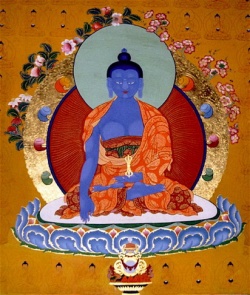Difference between revisions of "Aksobhya's Origin"
| Line 1: | Line 1: | ||
[[File:Akshobhya14k.jpg|thumb|250px|]] | [[File:Akshobhya14k.jpg|thumb|250px|]] | ||
| − | [[Akshobhya]] appears in the "[[Scripture of the Buddha-land of Akshobhya" ([[阿閃仏国経]] ''[[Ashuku Bukkyokukyō]]''), dating from 147 CE and the oldest known [[Pure Land]] text. According to the [[scripture]], a [[monk]] wished to practice the [[Dharma]] in the eastern [[world]] of [[delight]] and made a [[vow]] to think no [[anger]] or [[malice]] towards any [[being]] until [[enlightenment]] ([[Buddhism]]) [[enlightenment]]. He duly proved "[[immovable]]" and when he succeeded, he became the [[Buddha]] [[Akshobhya]]. [[Akshobya]] is sometimes merged with [[Acala]] (Jp. [[不動明王]] ''[[Fudō myō-ō]]''), whose [[name]] also means the [[Immovable]] One in [[Sanskrit]]. However, Acalanatha is not a [[Buddha]], but one of the [[Five Wisdom Kings]] of the [[Womb Realm]] in [[Vajrayana]]. Prior to the advent of [[Bhaisajyaguru]] ([[Yakushi]]), [[Akshobya]] was the [[subject]] of a minor popular {{Wiki|cult}} in [[Japan]] as [[healing]] [[Buddha]]. | + | [[Akshobhya]] appears in the "[[Scripture of the Buddha-land of Akshobhya]]" ([[阿閃仏国経]] ''[[Ashuku Bukkyokukyō]]''), dating from 147 CE and the oldest known [[Pure Land]] text. According to the [[scripture]], a [[monk]] wished to practice the [[Dharma]] in the eastern [[world]] of [[delight]] and made a [[vow]] to think no [[anger]] or [[malice]] towards any [[being]] until [[enlightenment]] ([[Buddhism]]) [[enlightenment]]. He duly proved "[[immovable]]" and when he succeeded, he became the [[Buddha]] [[Akshobhya]]. [[Akshobya]] is sometimes merged with [[Acala]] (Jp. [[不動明王]] ''[[Fudō myō-ō]]''), whose [[name]] also means the [[Immovable]] One in [[Sanskrit]]. However, Acalanatha is not a [[Buddha]], but one of the [[Five Wisdom Kings]] of the [[Womb Realm]] in [[Vajrayana]]. Prior to the advent of [[Bhaisajyaguru]] ([[Yakushi]]), [[Akshobya]] was the [[subject]] of a minor popular {{Wiki|cult}} in [[Japan]] as [[healing]] [[Buddha]]. |
{{R}} | {{R}} | ||
[http://www.mauspfeil.net/Akshobhya.html www.mauspfeil.net] | [http://www.mauspfeil.net/Akshobhya.html www.mauspfeil.net] | ||
[[Category:Buddhist Terms]] | [[Category:Buddhist Terms]] | ||
[[Category:Aksobhya]] | [[Category:Aksobhya]] | ||
Latest revision as of 00:21, 21 September 2013
Akshobhya appears in the "Scripture of the Buddha-land of Akshobhya" (阿閃仏国経 Ashuku Bukkyokukyō), dating from 147 CE and the oldest known Pure Land text. According to the scripture, a monk wished to practice the Dharma in the eastern world of delight and made a vow to think no anger or malice towards any being until enlightenment (Buddhism) enlightenment. He duly proved "immovable" and when he succeeded, he became the Buddha Akshobhya. Akshobya is sometimes merged with Acala (Jp. 不動明王 Fudō myō-ō), whose name also means the Immovable One in Sanskrit. However, Acalanatha is not a Buddha, but one of the Five Wisdom Kings of the Womb Realm in Vajrayana. Prior to the advent of Bhaisajyaguru (Yakushi), Akshobya was the subject of a minor popular cult in Japan as healing Buddha.
